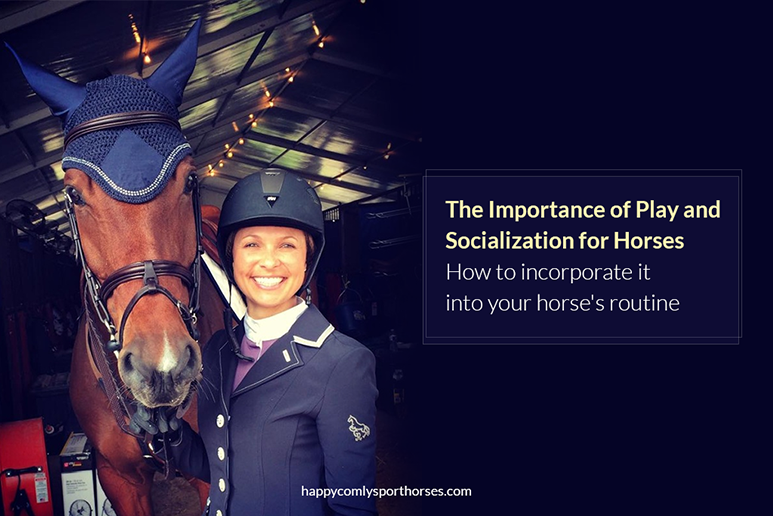
As an owner, you want the best for your horse. You provide him with a healthy diet, shelter, and regular exercise. However, one important aspect that many owners overlook is the importance of play and socialization for their horse.
Whether you own a horse for leisure activities or want to train it for dressage, show jumping, grand prix jumping, etc., you cannot ignore this aspect. Just like humans, horses thrive on social interaction and play. It is paramount for their well-being and overall health.
Let’s dive deep into the role play and socialization play in their lives and how you can incorporate these activities into your horse’s routine.
Why Play and Socialization for Horses Matter
Horses are social animals that evolved to live in groups or herds. They establish social hierarchies, communicate with each other, and form strong bonds. In the wild, horses spend their days grazing, playing, and socializing with other herd members. These skills are essential for horses to live in harmony with other horses, whether in a herd or close to other horses.
Domestic horses may not have the same opportunities to interact with other horses, which can lead to loneliness and boredom. Horses that are not properly socialized can develop behavioral issues such as anxiety, aggression, and stereotypic behaviors (repetitive behaviors such as cribbing, weaving, and stall walking).
Play is also essential for horses. It helps them learn and develop physical, mental, and social skills. Through play, horses learn how to use their bodies, build coordination, and explore their environment. Play also helps horses relieve stress and frustration, which can build up without opportunities to expend energy.
Types of Play
Horses engage in many types of play, including social, locomotor, object, and sensory play.
Sensory play involves horses exploring their environment, such as rolling in the grass or sniffing new things. Social play involves horses interacting with each other, such as nipping, biting, and chasing each other. Locomotor play involves horses running, jumping, and playing with their bodies. Object play involves horses playing with objects such as balls and toys.
Incorporating Play and Socialization into Your Horse’s Routine
Now that you understand the importance of play and socialization for your horse, you may wonder how to incorporate these activities into your horse’s routine.
Here are some tips to get you started:
Provide Toys and Obstacles
Toys and obstacles are a great way to encourage your horse to play and exercise. You can provide your horse with balls, cones, or even a large, sturdy ball they can push around with their nose. You can also set up obstacles such as poles or small jumps to encourage your horse to move and improve their coordination.
Turn Your Horse Out with Other Horses
Turning your horse out with other horses is one of the best ways to promote socialization. Horses must interact with other horses to develop social skills and establish their place within the herd. If you don’t have other horses on your property, consider taking them to a nearby stable or equestrian center where they can socialize with other horses.
Schedule Regular Playtime
Just like humans, horses need regular playtime to stay happy and healthy. Set aside time each day for your horse to play and have fun. You can take your horse for a walk, play games with them, or let them run around in a pasture or arena.
Provide Mental Stimulation
In addition to physical exercise, horses also need mental stimulation. You can provide your horse with mental stimulation by introducing new toys and games, providing them with different types of feeders, or even hiding treats for them to find.
Consider Training
Training is another great way to provide your horse with both physical exercise and mental stimulation. Training can help improve your horse’s coordination, balance, and agility while also allowing them to learn new skills and form a bond with their owner.
Horse Training Services by Comly Sports
If you are looking for professional horse training services, look no further than Comly Sports. We offer a wide range of services to help you and your horse achieve your goals. We have the expertise and experience from basic training to advanced competition training like grand prix jumping to help you and your horse reach your full potential.
Frequently Asked Questions
1. Why is socialization important for horses?
Socialization is crucial for a horse’s mental and emotional well-being. It helps them develop social skills and establish relationships with other horses. It also helps them learn how to communicate with each other, establish boundaries, and form bonds.
2. How does play benefit horses?
Play helps horses learn and develop physical, mental, and social skills. Through play, horses learn how to use their bodies, build coordination, and explore their environment. Play also helps horses relieve stress and frustration, which can build up without opportunities to expend their energy.
3. What are some ways to encourage play and socialization in horses?
Turning your horse out in a pasture with other horses is one of the best ways to encourage play and socialization. Providing toys, taking your horse on walks, and arranging playdates with other horse owners are great ways to promote these behaviors.
4. What common behavioural issues can arise if horses are not properly socialized and given opportunities to play?
Horses that are not properly socialized can develop behavioral issues such as anxiety, aggression, and stereotypic behaviors (repetitive behaviors such as cribbing, weaving, and stall walking). Horses not given opportunities to play can become bored and frustrated and develop behavioral issues.
More to read in Comly Sports Horses Blog
Source link



